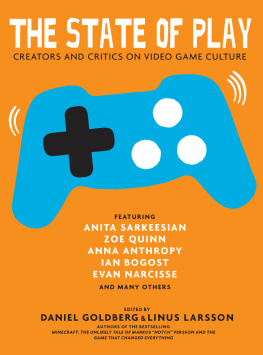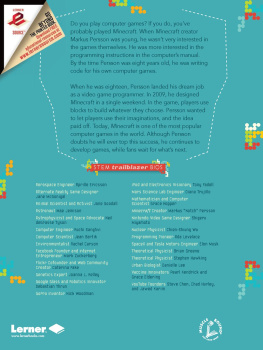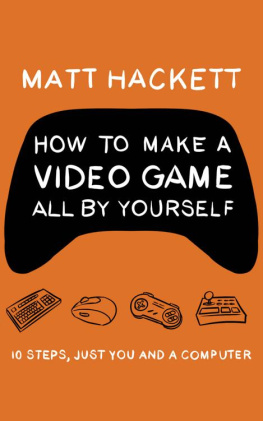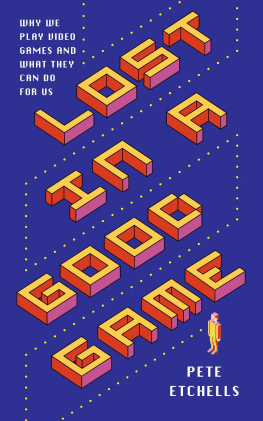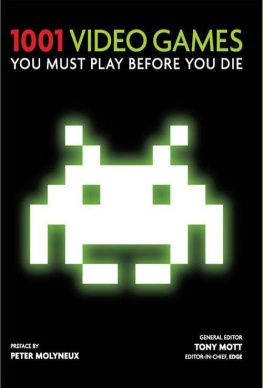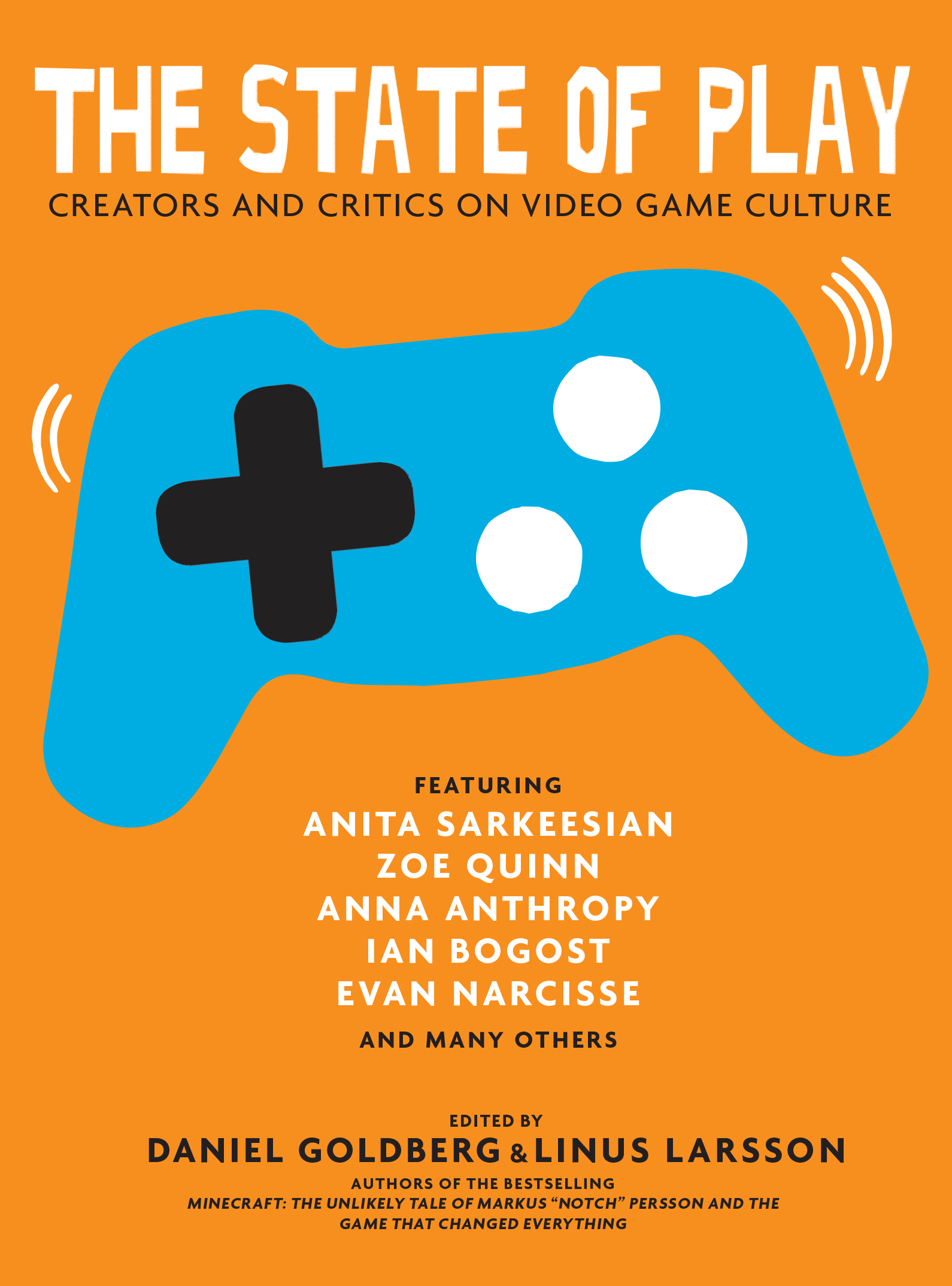Praise for The State of Play
If you want to explain to anyone why video games are worth caring about, this is a single-volume primer on where we are, how we got here, and where were going next. In every way, this is the state of play.
Kieron Gillen, author of The Wicked + The Divine , co-founder of Rock, Paper, Shotgun
Video games are now on the front lines of the culture wars. The State of Play gathers essential voices who are trying to make a more just, more true, more playful gamespace, one thats fun for everybody.
McKenzie Wark, author of Gamer Theory
The State of Play is an excellent primer [and] a much-needed alternative look at the state and stakes of video game culture, today and tomorrow.
Angela Washko, artist and founder of The Council on Gender Sensitivity and Behavioral Awareness in World of Warcraft
We are past the era when it was surprising to learn that video games are more than just pleasurable power fantasies. Video games are emotional explorations of race, gender, sex and love. Video games give us intense experiences of being others, or finding ourselves, alone with the computer or surrounded by crowds, in physical or virtual spaces. The State of Play is a key collection of writings to understand why playing video games matters more than ever.
Miguel Angel Sicart, author of Play Matters and The Ethics of Computer Games
Like a game that opens your heart, I found more than I came for in The State of Play.... Not what I expected, but much more. The thoughtful, articulate essays recursively confirm the importance of gaming to society, the books key theme. Beautifully written in workmanlike, accessible prose, and highly recommended.
Bonnie Nardi, author of My Life as a Night Elf Priest: An Anthropological Account of World of Warcraft
This highly recommended edition is not just about the state of play, it is about so much more: the state of everything digitalby way of video games, in spite of them, transcending them. Yes, indeed: games are f****** political.
Dr. Steffen P. Walz, co-editor of The Gameful World
This diverse collection demonstrates the deep power of anchoring our design theories in the lived experiences of players and creators. It offers a kaleidoscopic view of the possibility space of games, providing exciting new perspectives on play and the construction of play spaces.
Brian Upton, author of The Aesthetic of Play
Through a combination of deeply personal narratives and academic analyses The State of Play effectively illuminates the social and cultural relevance of gaming.... The authors do not simply discuss what games are technically, but what they are, can, and should be culturally.
Ellen Middaugh, co-editor of #youthaction: Becoming Political in the Digital Age
Creators and Critics on Video Game Culture
Ian Bogost Leigh Alexander Zoe Quinn A nita Sarkeesian & Katherine Cross Ian Shanahan anna anthropy Evan Narcisse Hussein Ibrahim Cara Ellison & Brendan Keogh Dan Golding David Johnston William Knoblauch merritt kopas Ola Wilkander
Edited by
Daniel Goldberg & Linus Larsson
Seven Stories Press
New York Oakland
Copyright 2015 by Daniel Goldberg and Linus Larsson
A Seven Stories Press First Edition
All rights reserved. No part of this book may be reproduced, stored in a retrieval system, or transmitted in any form or by any means, including mechanical, electronic, photocopying, recording, or otherwise, without the prior written permission of the publisher.
Seven Stories Press
140 Watts Street
New York, NY 10013
www.sevenstories.com
College professors may order examination copies of Seven Stories Press titles for free. To order, visit http://www.sevenstories.com/textbook or send a fax on school letterhead to (212) 226-1411.
Book design by Elizabeth DeLong and Jon Gilbert
Library of Congress Cataloging-in-Publication Data
The state of play : sixteen voices on video games / edited by Daniel Goldberg and Linus Larsson. -- First edition.
pages cm
ISBN 978-1-60980-639-2 (hardcover)
1. Video games--Social aspects. I. Goldberg, Dan (Daniel) II. Larsson, Linus.
GV1469.34.S52S73 2015
794.8--dc23
2015004641
Printed in the United States
9 8 7 6 5 4 3 2 1
Contents
Introduction
Daniel Goldberg & Linus Larsson
Leigh Alexander
Ian Shanahan
anna anthropy
Evan Narcisse
Hussein Ibrahim
Zoe Quinn
Anita Sarkeesian & Katherine Cross
Dan Golding
Cara Ellison & Brendan Keogh
Ian Bogost
David Johnston
William Knoblauch
merritt kopas
Ola Wikander
Introduction
Post-Escapism: A New Discourse on Video Game Culture
Daniel Goldberg & Linus Larsson
Ask anyone you meet on the street and chances are they will have spent more time in the past week or month playing video games than reading books or magazines. A few short decades ago, video games were considered a niche hobby for nerds and computer geeks. Today, they are an inseparable part of global popular culture. Video games are everywhere, played by people of all ages, faiths, and nationalities. Game design is taught in schools next to architecture, photography, and fashion. Big-budget video games often surpass Hollywood blockbusters in terms of both production budgets and profitability.
And yet, video game culture has been reluctant to step out of the boys room. There are of course historical exceptions (for example, see William Knoblauch on the subtle anti-war subtexts of many Cold War-era video games, page 183), but unlike, say, music or literature, games have no strong tradition of engaging with social issues, politics, or the culture that surrounds them. Game designers have historically eschewed reality and the present day for the fantastical and imaginary, with light-hearted science fiction, fantasy, and fairy-tale settings as staples of the form. Many argue that escapism is precisely the point.
There are historical reasons for this. More than any other form of creative expression, video games are highly dependent on, and to a certain extent an offshoot of, advances in computing and digital technology. This means games have traditionally been engaged with and discussed as products of technology rather than products of culture, which is why most game criticism still tends to read a lot like a review of a mobile phone or a car. The specialist gaming press has a long tradition of consumer-oriented criticism, using simple, quantifiable parameters to measure the technical proficiency and craftsmanship of the game designer, the fun level of a game, and the value for the money that a game provides. How smooth are the animations? How sophisticated are the graphics? How well-balanced are the rules?
Video game production has historically been prohibitively expensive and time-consuming, giving big-name publishers a virtual monopoly on production, sales, and marketing. As a result, the cultural identity of the gamer was from an early stage largely appropriated and shaped by the dominant corporate interests of the industry. This created a consumption-centric culture with its own norms and value systems, clustered around a small number of brands and big-budget franchises while showing little concern for identities other than the prime demographic of the young, white, Western male.

